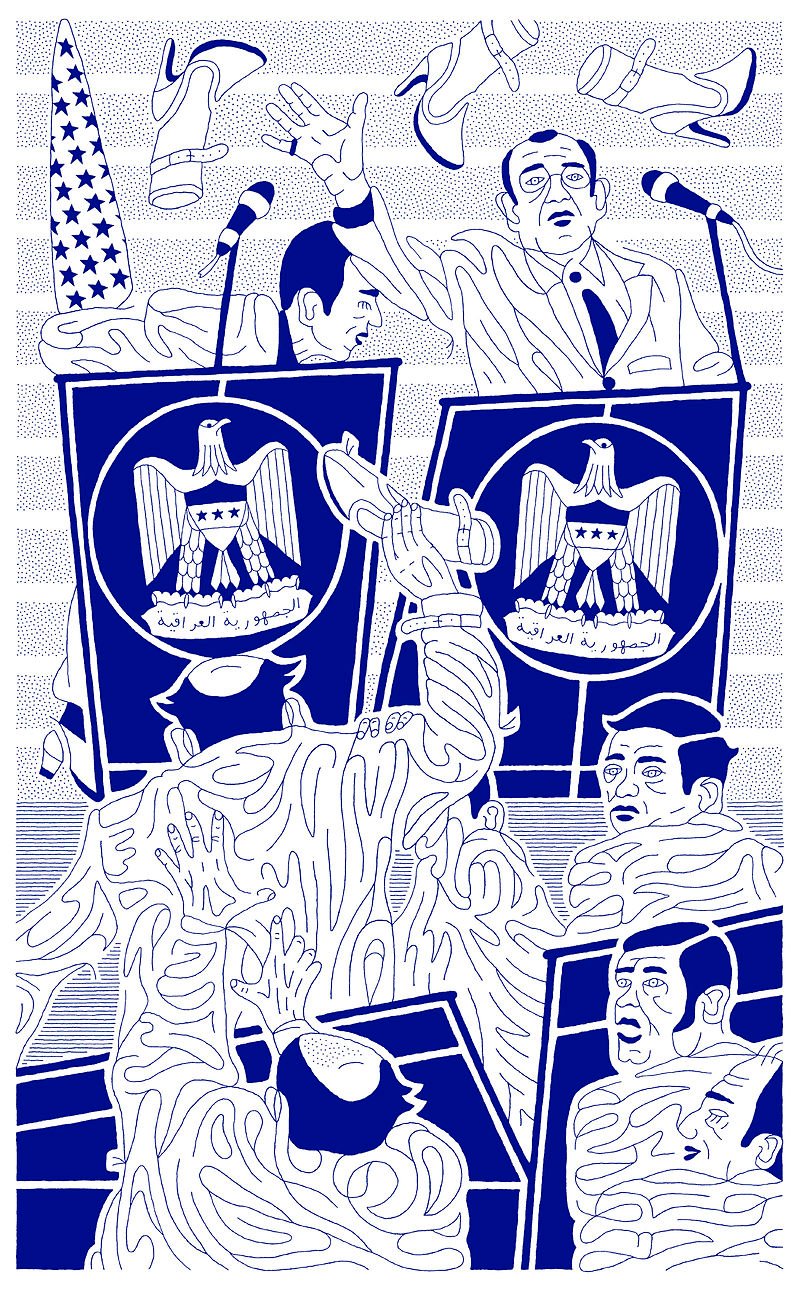In the annals of history, there are certain events that capture the imagination and serve as potent symbols of dissent and protest. One such incident occurred on December 14, 2008, when Iraqi broadcast journalist Muntadhar al-Zaidi made headlines around the world by throwing his shoes at U.S. President George W. Bush during a press conference in Baghdad. This act of defiance, which may seem trivial to some, carried deep significance in Arab culture and reflected the widespread resentment towards the U.S. involvement in Iraq.
The incident itself was captured on live television, making it an unforgettable moment in modern history. As President Bush was addressing the media, al-Zaidi, who was working for the Cairo-based TV network Al-Baghdadia at the time, stood up and shouted, “This is a farewell kiss from the Iraqi people, you dog!” before hurling his shoes towards the President. The shoes missed their target, but the symbolism behind the act resonated deeply with Iraqis and people across the Arab world.
Throwing shoes at someone is considered a grave insult in Arab culture. The bottom of the shoe is seen as unclean, and using it to express disdain towards another person is a powerful gesture. By throwing his shoes at President Bush, al-Zaidi was not only expressing his personal frustration, but also channeling the collective anger and disillusionment felt by many Iraqis towards the U.S.-led invasion and the subsequent occupation of their country.
It is important to understand the historical context in which this incident took place. The U.S. invasion of Iraq in 2003, based on the pretext of finding weapons of mass destruction, was met with widespread opposition both within Iraq and internationally. Many Iraqis viewed the invasion as an act of aggression and a violation of their sovereignty. The subsequent years of occupation were marked by violence, instability, and a deteriorating quality of life for ordinary Iraqis.
Muntadhar al-Zaidi’s act of throwing his shoes at President Bush became a symbol of Iraqi resistance and an expression of the frustration and anger that had been building up for years. It resonated with people who felt voiceless and marginalized, both within Iraq and in the broader Arab world. The incident sparked protests and demonstrations across the region, with many praising al-Zaidi for his bold act of defiance.
However, the consequences for al-Zaidi were severe. He was immediately tackled by security personnel and taken into custody. He endured physical and psychological abuse during his imprisonment, which lasted for nine months. Despite the hardships he faced, al-Zaidi became a hero to many, a symbol of bravery and resistance against perceived injustice.
The shoe-throwing incident also brought attention to the larger issue of media freedom in Iraq. Journalists in the country faced numerous challenges and dangers, with many being targeted for their reporting. Al-Zaidi’s act highlighted the risks journalists took to speak truth to power and the importance of a free and independent press in holding governments accountable.
Today, more than a decade after the shoe-throwing incident, the legacy of Muntadhar al-Zaidi lives on. He has become an iconic figure in the fight against oppression and a symbol of the power of individual acts of protest. The incident serves as a reminder of the deep-rooted resentment towards the U.S. involvement in Iraq and the lasting impact of the invasion and occupation on the lives of ordinary Iraqis.
As we reflect on the events of December 14, 2008, it is crucial to remember the historical context and the emotions that fueled al-Zaidi’s act of defiance. It was not simply an act of aggression, but a desperate plea for justice and recognition. The shoe-throwing incident stands as a powerful symbol of Iraqi resentment and protest, reminding us of the enduring power of individual actions to challenge and question authority.
SEO Excerpt:
Discover the historical significance of Muntadhar al-Zaidi’s shoe-throwing incident (2008) during a press conference in Baghdad. Explore the deep-rooted resentment towards the U.S. involvement in Iraq and the lasting impact of the invasion and occupation on the lives of ordinary Iraqis. Learn about the symbolism behind the act and the heroism of al-Zaidi in the face of adversity.

